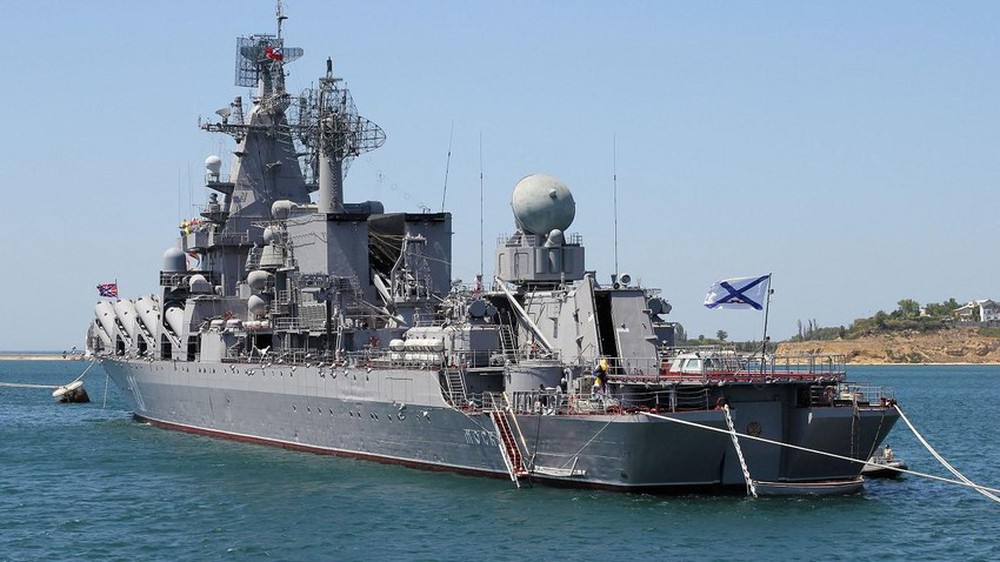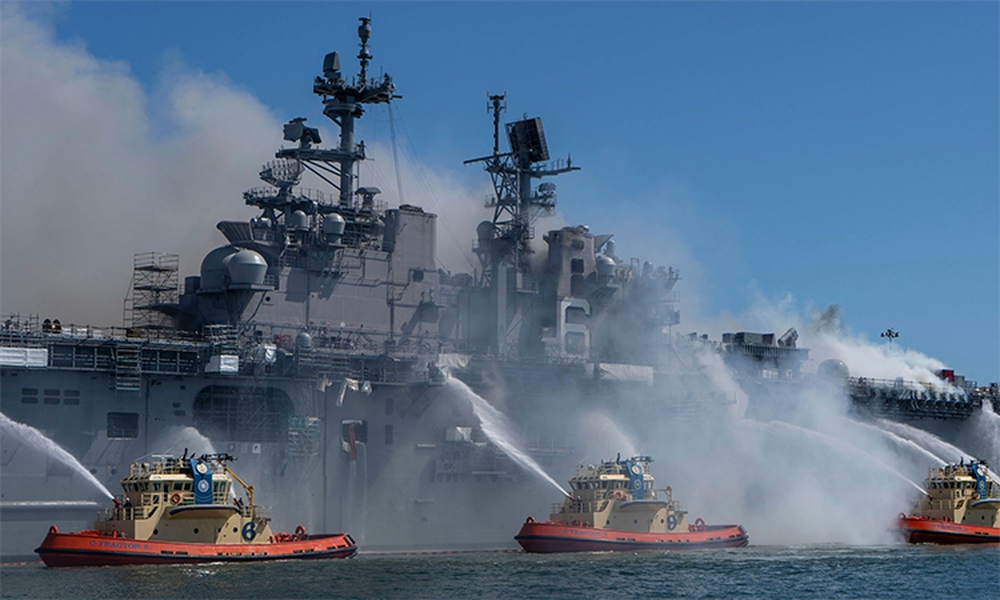According to the Washington Post, the sinking of the battleship Moscow will affect the operations of global naval forces.
The incident of the Russian battleship Moskva sunk in the Black Sea on April 14 marked the first destruction of a capital warship since the Falklands War 40 years ago.
In that war, both Britain and Argentina lost large warships in the frigid waters of the South Atlantic.
And for Russia, it is the first such major loss since World War II.
First is the iconic blow: The ship is named after the Russian capital – think of the blow to morale and prestige if America loses the aircraft carrier George Washington.
Moscow is also a command and control node capable of directing the rest of the Black Sea Fleet, which is believed to be preparing for an attack or amphibious assault around the vital Ukrainian seaport of Odesa.
In the end, the long-range cruise missile on the battleship failed to work.
While the loss of a ship is not catastrophic in itself, it is a significant step back. With the loss of two significant warships (one amphibious ship was destroyed in port a few weeks ago), the Russian navy will be doubly cautious in approaching Ukraine’s shores.
How will this dramatic event affect the war in Ukraine? And what are the lessons for navies around the world?

Missile frigate Moscow of the Russian Black Sea Fleet. Photo: 19 Fortyfive
Weaknesses of battleships
Writing in Bloomberg, expert James Stavridis said that he personally visited Russian warships many times (including when it was stationed in the city of Sevastopol before Russia opened its military operation in Ukraine).
And according to him, surface ships produced in the 1970s and 1980s, such as the Slava-class Moscow, have some weaknesses in terms of structure and personnel.
The most notable shortcoming is that there is no built-in combat compartment as found on warships of the United States and other Western countries.
Instead of needing multiple watertight doors that can be slammed shut when ships are in the commons (all of which have hands to control their battle stations), Russian ships have few and are likely to sink.
Another surprisingly important shortcoming is a strong force of medium specialists in the crews of the Russian Navy.
In the US Navy, this force is called non-commissioned officers, sailors with 10-15 years of experience and can lead other sailors on deck. They are the backbone of the US Navy, and the lack of such a staff is a big problem for Russia.
Stavridis also said that, according to a retired US surface combat captain, who once toured a Russian cruiser, there were many conscripts on the Russian ship – reflecting the lack of a tight chain of command.
That may not matter in peacetime, but quickly becomes problematic in wartime.
In the case of Moscow, according to this expert, there is currently no accurate report to fully assess the problems, but there are some highlights.
Most obviously, if it was defeated by Ukraine’s Neptune cruise missile, it would show a major flaw in its inability to be ready to defend itself against cruise missiles.
Whether that comes from lax “standby” – meaning the sailors are not at battle stations – or the ship’s air defenses are not technologically advanced enough, it is a major shortcoming.
In addition, the Moscow battleship’s ability to withstand large attacks but still float, known as “damage control” in the parlance of the US Navy, is also absent.
On an American warship, the crew is organized in battle stations scattered throughout the ship equipped and prepared to respond to fires, floods, power outages and other problems.
It seems that the crew of the battleship Moskva not only could not prevent the missile attack, but also could not control the problem that occurred such as fire and subsequent sinking.

The US battleship USS Bonhomme Richard had a fire problem in 2020. Photo: AFP
Great global lesson
Ultimately, the sinking is expected to have an impact on the operations of global navies.
It’s a stark reminder of the vulnerability of surface ships – including aircraft carriers, the heart of the US Navy – to the relatively cheap, numerous and technologically advanced cruise missiles.
As Ukrainian forces have demonstrated by attacking tanks, armored personnel carriers and helicopters with only cheap weapons, the cost benefits of destroying cruise missiles are enormous for the force. attack.
Both Britain and Argentina learned about the failings in the defenses of ships in the Falklands when London lost two destroyers and Buenos Aires was worse.
But in the two decades of the so-called “forever war”, the Western navies did not operate comfortably because the Afghans, Iraqis and Syrians did not have Neptune-style cruise missiles.
The “death” of the battleship Moskva is a vivid reminder of the need for well-honed anti-aircraft weapon systems and tactical options when operating near shores. sea.
And it’s not just Russia that needs to learn from this incident, so should the US and its powerful allies.
The United States may have the most powerful navy in the world, but it is clearly fragile, and the sinking of the Moscow ship is a sign that a similar lesson could be learned for its Navy.
Even according to The Week, former US assistant secretary of defense Christopher Dougherty once confirmed: “The US Navy is on the brink of strategic bankruptcy. The fleet is not large enough to meet the daily needs of the sea. global for navies”.
at Blogtuan.info – Source: Soha.vn – Read the original article here



